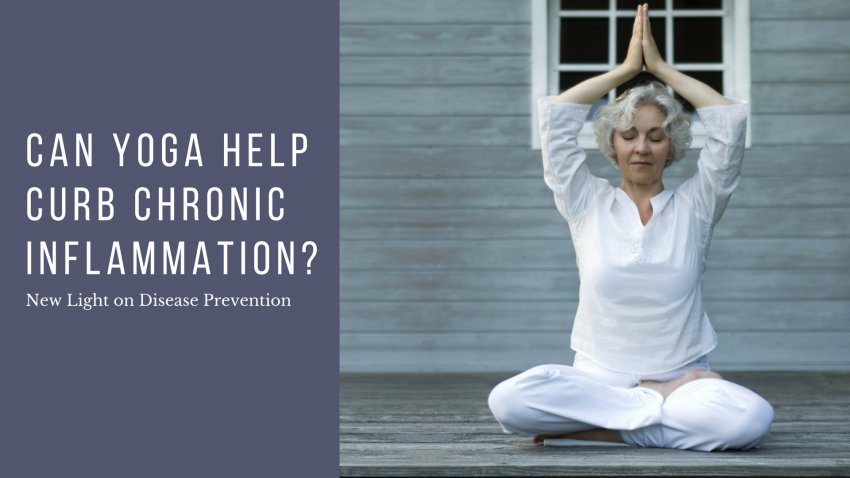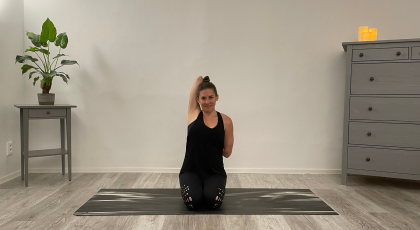View basket (0 items $0.00)

Can Yoga Help Curb Chronic Inflammation? New Light on Disease Prevention
Does your energy sometimes slump for no apparent reason? Are mornings punctuated by mild aches and pains that gradually ease up as you get moving? How about digestion - is yours a bit cranky at times? These symptoms are easily attributed to our fast-paced, frequently overscheduled lives.
But mounting evidence points to another potential culprit, a hidden health saboteur that may be setting the stage for future woes: Chronic Inflammation.
While the inflammatory process is the body’s normal defensive response to help fight threats such as wounds, oncoming viruses, or irritants such as insect bites, these acute episodes are normally short-lived, lasting only long enough to aid in the healing process.
Chronic inflammation, on the other hand, can last months or years. Once the natural response mechanism is compromised, the immune system’s ability to distinguish between foreign invaders and the body is decreased, making the body vulnerable to attacks from its own defense system.
For this reason, like high blood pressure, chronic inflammation is now considered a common precursor to numerous chronic diseases, including Alzheimer’s, heart disease, diabetes, thyroid issues, arthritis, depression, and poor weight management.
Dr. Baxter Bell, a medical doctor and co-author of Yoga for Healthy Aging, has been researching the long-term effects of chronic inflammation with a special view of how yoga can help prevent or reverse the issue. With his focus on yoga for healthy aging, chronic inflammation has been of particular interest.
“This is an exciting, cutting-edge topic,” notes Baxter. “Our understanding of how chronic inflammation impacts our health is expanding every day. Learning how to affect levels of chronic inflammation in our body gives us powerful new tools for prevention of some of the leading chronic diseases.”
How Inflammation Disrupts Normal Immune Function
As the chronic inflammation picture comes into clearer focus, so do the mechanics of how it can eventually set off a chain reaction within body systems, including changes at the molecular level. Baxter offers the example of the the way insulin functions in the body. Chronic inflammation creates an increased risk of insulin resistance, which in turn increases the chance of developing type II diabetes. This then raises your chances of getting metabolic syndrome. From there, your risk of having a stroke or heart attack goes up.
“It’s a cascade of events, but one of the initial precipitators is the presence of inflammation,” says Baxter. “The inflammation can increase the number of radicalized oxygen molecules in the body and seems to have an effect on creating more of that sort of molecule in the body, disrupting its normal immune function. This affects the way white blood cells respond to normal circumstances, so they no longer operate normally. That might then contribute to the development of more autoimmune problems down the road. But the inflammation affecting immune system molecules is what starts the cascade.”
Inflammaging: Why Aging Is A Risk Factor for Chronic Inflammation
On the subject of aging well, there’s an added wrinkle: Aging itself is now considered a risk factor for chronic inflammation. Baxter describes it this way: “It turns out that aging itself, getting older day by day, increases the chances of chronic inflammation being present in the body. It’s called inflammaging – Inflammation combined with aging. This is the technical term now being used in research literature and studies to describe this process of advancing age and increasing chance of chronic inflammation.”
Another known inflammatory agent is stress. “We know that stressful situations in our lives tend to increase the inflammatory markers in our body, which seems to indicate there’s a higher level of chronic inflammation present on a daily basis. Chronic stress contributes to chronic inflammation,” Baxter states.
And there are some other dots to connect.
Says Baxter, “When you step back and look at them, the illnesses that fall under stress-related illnesses and the illnesses that seem to be precipitated by inflammation are from the same group: heart disease, cancer, autoimmune diseases, dementia, cognitive changes. These come up repeatedly. Even though we’ve talked about them in the past as being these kind of entities that exist in a little box, it turns out that they may have the same seed from which they sprout.”
Besides stress, Baxter says that other lifestyle risk factors for the presence of inflammation include our behavior, our eating habits, and the choices that we make in terms of what we’re taking in.
How Yoga Can Help Prevent or Reduce Chronic Inflammation
Regardless of age, Baxter counsels that we’ve got lifestyle tools to take preventative measures, or even reverse the inflammation process that is already present in our bodies all the way to the molecular level. “On some level, if we adopt the proper lifestyle choices, we will actually be able to impact and influence the levels of inflammation in our body to a certain extent,” he advises. Emerging science backs him up.
A study published in 2017 in the journal Frontiers in Immunology, reviewed over a decade of studies that examined the positive affects mind body interventions such as yoga and meditation had on the behavior of our genes. The results of a study by the Universities of Coventry and Radboud in the UK revealed that such practices don’t simply relax us, but can actually ‘reverse’ the molecular reactions in our DNA that cause ill-health and depression. In other words, yoga can positively affect the way our genetic code operates.
Lead investigator Ivana Buric from Coventry University put it this way, “These activities are leaving what we call a molecular signature in our cells, which reverses the effect that stress or anxiety would have on the body by changing how our genes are expressed. Put simply, mind body interventions cause the brain to steer our DNA processes along a path which improves our wellbeing.”
Lifestyle Also Matters
Baxter advises that adopting a yogic or even Ayurvedic lifestyle of eating less-inflammatory foods factors big in the wellness equation. “The yogic tradition often talks about a good, healthy vegetarian diet, including more green leafy vegetables, dark yellow vegetables and fruits, and avoiding processed foods and all the junk food and meats and things that have been shown to be pro-inflammatory in the body,” says Baxter.
Baxter’s look at recent research offers another way in which yoga is an effective tool to help lower systemic inflammation on a chronic basis. “Our yoga practices can support better choices because we get better at self-regulating how we respond to stress and different factors, being rushed to work and this and that. We get better at self-regulating and making better choices,” he says.
People who already live a fairly healthy lifestyle are not automatically immune to the effects of low level inflammation, however. In those cases, Baxter suggests a bit of retooling of current habits, such as incorporating more meditation into yoga practice or moving to a less aggressive physical practice to help manage daily stress. And like any other diet, making sure your regular yoga practice includes a healthy mix of ingredients. “We know that a combination of restorative and mildly active yoga poses, breath practices, and meditation techniques can be really excellent choices in your toolbox,” he explains.
“We can be a little more proactive, utilize our lifestyle tools as preventative medicine in a sense, and reverse a process that hopefully hasn’t been around for too long but we know that we can impact it on some level.”
To get a better understanding of inflammation and the role it plays on the immune system, you may be interested in Baxter’s YogaUOnline course, Yoga for Healthy Aging: Curbing Inflammation to Prevent Chronic Disease.
 Lynn Crimando, MA serves as the teaching mentor for YogaUOnline's Wellness Educator Program. She is a yoga teacher, C-IAYT Yoga Therapist, board-certified Health and Wellness Coach, and a Buteyko Practitioner. She has a private practice in New York City and teaches classes throughout the city on behalf of Health Advocates for Older People. In addition, Lynn is on the faculty of the IAYT-approved Yoga Polarity Therapist Training in Malverne, New York. To learn more about Lynn, visit her website: yogalynn.com.
Lynn Crimando, MA serves as the teaching mentor for YogaUOnline's Wellness Educator Program. She is a yoga teacher, C-IAYT Yoga Therapist, board-certified Health and Wellness Coach, and a Buteyko Practitioner. She has a private practice in New York City and teaches classes throughout the city on behalf of Health Advocates for Older People. In addition, Lynn is on the faculty of the IAYT-approved Yoga Polarity Therapist Training in Malverne, New York. To learn more about Lynn, visit her website: yogalynn.com.
Featured Courses








